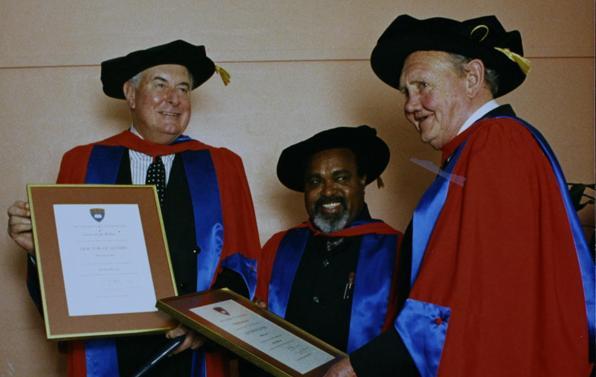"Father of the Nation" awarded Honorary Doctor of Letters from UOW in 1989

Sir Michael Somare, the first and longest-serving Prime Minister of Papua New Guinea, passed away at the age of 84 in the nation's capital of Port Moresby last Friday (26 February).
In December 1989, Sir Michael was awarded an Honorary Doctor of Letters from the University of Wollongong (UOW), in recognition of the immense role he played in leading Papua New Guinea to independence.
The doctorate was conferred in a ceremony in Wollongong, presided over by then UOW Vice-Chancellor Ken McKinnon. Sir Michael received the honour alongside two Australian former Prime Ministers, Gough Whitlam and Sir John Gorton, in acknowledgement of the role each party played in pushing for sovereignty in the Pacific nation.
Born in Rabaul in 1936, Sir Michael's early life was defined by the duality of the then Australian-administered realm of New Guinea. Sir Michael's father was both a Chieftain and a sergeant of the local police. The young Michael attended a Japanese-run primary school during World War II, before later undertaking high school and enrolling in Teachers College in 1956. Becoming a teacher was then a well-worth path for Indigenous leaders.
Upon graduation, Sir Michael taught at local schools, before turning his hand to radio broadcaster. His interest in politics, and belief that New Guinea could become a sovereign nation, led into politics a short time later.
In 1968, Sir Michael ascended to the leadership of the Pangu Pati, representing the East Sepik Province where he had spent much of his early life.
At the time, he dreamed of a nation governed by its people, rather than Australia, which had administered the Territory of New Guinea since the end of World War II. Sir Michael represented a new generation of leadership, young, engaged and ready to govern.
Working alongside Australian leaders Gough Whitlam and Sir John Gorton, Sir Michael began to forge a path forward to independence. He used his considerable skills in diplomacy to bridge the gap between New Guinea's past and future, travelling to the highlands and villages to speak with his more conservative countrymen.
In 1975, Papua New Guinea achieved independence and Sir Michael became the first Prime Minister of the fledgling nation at the age of 39. The then Prime Minister of Australia, Mr Whitlam, remarked at the time that Papua New Guinea "had found a man whose time has come". Sir Michael became known as the "Father of the Nation" and "The Chief" and was knighted by Queen Elizabeth II in 1990. He was one of only two people in Papua New Guinea's history to become a "Grand Chief".
Sir Michael would go on to lead Papua New Guinea for four terms, a total of 17 years, as well as the roles of Opposition Leader, Foreign Affairs Minister, and Governor of the East Sepik Province. He spent 49 years in Parliament.
Following independence, Sir Michael was instrumental in encouraging the traditional way of life within the context of a modern Papua New Guinea. He brought together the complex tapestry of Papua New Guinea, a nation home to more than 800 languages and millions of people. In particular, Sir Michael was passionate about expressing national unity through arts and culture, and one of his earliest initiatives was requesting a grant from the Australian Government for a cultural development program.
In a ceremony to make the Honorary Doctor of Letters from UOW in 1989, Sir Michael was recognised as "a man who is not content to move with the tides of history".
The University recognised Sir Michael's conviction and success in transforming the nation of Papua New Guinea through cultural and intellectual pursuits while maintaining a focus on national unity.
Sir Michael is survived by his wife of more than 55 years, Lady Veronica Somare, and their five children.
The University of Wollongong extends its deepest condolences to Sir Michael's family.
Main photo: Sir Michael Somare, centre, with former Australian Prime Ministers Gough Whitlam and Sir John Gorton receiving their Honorary Doctor of Letters from UOW in 1989.






